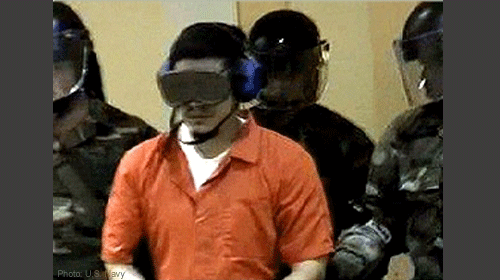
When Deputy Attorney General James Comey addressed the American people nine years ago, he told them what he called a "sobering story" about Jose Padilla. He described the then 33-year-old accused al Qaeda member's intent to detonate a dirty bomb as well as blow up apartment buildings in an American city. By agreeing to attack the United States on behalf of al Qaeda, Padilla, Comey argued, could be deprived of a lawyer and indefinitely detained as an enemy combatant on a military brig off the South Carolina coast for the purpose of extracting more intelligence about al Qaeda out of him, regardless of the fact he was an American citizen arrested on American soil.
Much of this information has been uncovered because Jose Padilla has been detained as an enemy combatant and questioned. We have learned many things from Padilla that I'm not going to discuss today...
Had we tried to make a case against Jose Padilla through our criminal justice system, something that I, as the United States attorney in New York, could not do at that time without jeopardizing intelligence sources, he would very likely have followed his lawyer's advice and said nothing, which would have been his constitutional right.
He would likely have ended up a free man, with our only hope being to try to follow him 24 hours a day, seven days a week, and hope -- pray, really -- that we didn't lose him.
But Jose Padilla was more than a criminal defendant with a broad menu of rights that we offer in our great criminal justice system. On May the 8th of 2002, a soldier of our enemy, a trained, funded and equipped terrorist, stepped off that plane at Chicago's O'Hare: a highly trained al Qaeda soldier who had accepted an assignment to kill hundreds of innocent men, women and children by destroying apartment buildings; an al Qaeda soldier who still hoped and planned to do even more by detonating a radiological device, a dirty bomb, in this country; an al Qaeda soldier who was trusted enough to spend hour after hour with the leaders of al Qaeda, Mohammed Atef, Abu Zubaida, Khalid Shaikh Mohammed; an al Qaeda soldier who had vital information about our enemy and its plans; and lastly an al Qaeda soldier who, as an American citizen, was free to move in, within and out of this country.
At the close of his speech, Comey—much like he did when approving the torture techniques used by the Bush administration—justified rights violations. He said that because of Padilla's military detention and interrogation, "what we have learned confirms that the president of the United States made the right call and that that call saved lives."
(Find more information on Padilla's unlawful detention and abuse here.)
But it turned out Padilla was never charged with the list of crimes and criminal associations pinned on him by Comey. When Padilla was finally convicted in a federal court in August 2007, it wasn't for plotting dirty bomb attacks or blowing up apartment buildings. Rather he was convicted of material support of terrorism overseas. Whatever his crime, torture is never acceptable. The government's indefinite military detention and torture of Padilla – a U.S. citizen captured on U.S. soil – undermined the Fifth, Sixth, and Eighth Amendments of the Constitution, fundamentally violating the constraints on what the executive can do to the people inside this nation.
And yet Comey defended the government's actions.
Nine years later, in deciding upon an appropriate nominee for the position of director of the FBI, President Obama should seriously consider a candidate's beliefs in and defense of the propriety of indefinite detention of American citizens. And the Senate should as well, especially if the president sees fit to go ahead and make the nomination of Comey official.
As USA Today put it so straightforward and eloquently last year: "Indefinite detention is un-American."
For more on the unsettling record of President Obama’s prospective pick to lead the FBI, see "James Comey: A Closer Look".
Learn more about torture and other civil liberties issues: Sign up for breaking news alerts, follow us on Twitter, and like us on Facebook.



